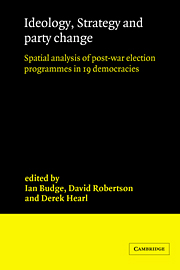 Ideology, Strategy and Party Change
Ideology, Strategy and Party Change Book contents
- Frontmatter
- Contents
- List of Tables
- List of Figures
- Preface
- 1 The influence of election programmes: Britain and Canada 1945–1979.
- 2 The internal analysis of election programmes.
- 3 Britain, Australia, New Zealand and the United States 1946–1981, an initial comparative analysis.
- 4 Canada 1945–1980: party platforms and campaign strategies.
- 5 Sri Lanka 1947–1977: elite programmes and mass politics.
- 6 Israel 1949–1981.
- 7 Ireland 1948–1981: issues, parties, strategies.
- 8 Northern Ireland 1921–1973: party manifestos and platforms.
- 9 Sweden and Denmark 1945–1982: election programmes in the Scandinavian setting.
- 10 The Netherlands 1946–1981.
- 11 Belgium 1946–1981.
- 12 Luxembourg 1945–1982: dimensions and strategies.
- 13 Austria 1945–1978.
- 14 Electoral programmes in West Germany 1949–1980: explorations in the nature of political controversy.
- 15 France 1958–1981: the strategy of joint government platforms.
- 16 Italy 1946–1979: ideological distances and party movements.
- 17 Japan 1960–1980: party programmes in elections.
- 18 Do parties differ, and how? Comparative discriminant and factor analyses.
- Appendices
- A Documentary sources
- B The general coding frame and special country codes
- C Factor analytic strategies used in the investigation of election programmes
- General bibliography
- Index
C - Factor analytic strategies used in the investigation of election programmes
Published online by Cambridge University Press: 27 October 2009
- Frontmatter
- Contents
- List of Tables
- List of Figures
- Preface
- 1 The influence of election programmes: Britain and Canada 1945–1979.
- 2 The internal analysis of election programmes.
- 3 Britain, Australia, New Zealand and the United States 1946–1981, an initial comparative analysis.
- 4 Canada 1945–1980: party platforms and campaign strategies.
- 5 Sri Lanka 1947–1977: elite programmes and mass politics.
- 6 Israel 1949–1981.
- 7 Ireland 1948–1981: issues, parties, strategies.
- 8 Northern Ireland 1921–1973: party manifestos and platforms.
- 9 Sweden and Denmark 1945–1982: election programmes in the Scandinavian setting.
- 10 The Netherlands 1946–1981.
- 11 Belgium 1946–1981.
- 12 Luxembourg 1945–1982: dimensions and strategies.
- 13 Austria 1945–1978.
- 14 Electoral programmes in West Germany 1949–1980: explorations in the nature of political controversy.
- 15 France 1958–1981: the strategy of joint government platforms.
- 16 Italy 1946–1979: ideological distances and party movements.
- 17 Japan 1960–1980: party programmes in elections.
- 18 Do parties differ, and how? Comparative discriminant and factor analyses.
- Appendices
- A Documentary sources
- B The general coding frame and special country codes
- C Factor analytic strategies used in the investigation of election programmes
- General bibliography
- Index
Summary
There is no place in this book to describe or explain factor analysis in any detail, and it is improbable that anyone without at least a basic understanding of the technique will use our material. However all the studies in this work rely heavily on factor analysis in several ways, so it was thought useful to provide some notes on the detailed conventions we have adopted. The general considerations leading to the adoption of factor analysis for our research are briefly reviewed in Chapters 2 and 3 (Sections 2.8 and 3.4)
Because of the crucial need for comparability between the various country analyses, the Research Group spent a good deal of time at an early stage standardizing procedures, and deriving common solutions to the common problems faced. Consequently there is no reason to doubt the inter-comparability of the technical results in different chapters – though this does not, of course, extend to guaranteeing substantive comparability. Technical uniformity is further aided by the fact that, as the SPSS package of programmes is now almost universally available, it was possible to insist that the same programme should be used by all analysts. As a result we were able to operationalize our common decisions very precisely, to the point of specifying which options were to be selected on procedure cards inside the SPSS Factor Analysis program. In many cases the analyses were carried out entirely at the University of Essex by Hearl.
- Type
- Chapter
- Information
- Ideology, Strategy and Party ChangeSpatial Analyses of Post-War Election Programmes in 19 Democracies, pp. 468 - 471Publisher: Cambridge University PressPrint publication year: 1987


